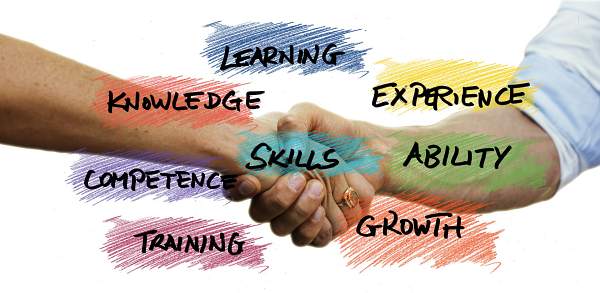INTERPERSONAL SKILLS VS HARD SKILLS: Definition, Importance
In job descriptions, candidates are often asked for a combination of interpersonal and hard skills. Interpersonal Skills vs Hard Skills, what you should know and dedicate your time and resources to learn – check below.
Hard skills are related to professional knowledge, tools, or techniques that allow us to work within our profession. In contrast, Interpersonal skills are skills involved in dealing with and relating to other people, mainly on a one-to-one basis. Both types of skills are necessary to perform and advance in most jobs successfully.
Hard skills can be taught and measured, such as web designer, engineering, writing an article, speaking a foreign language, or Computer programming. On the other hand, Interpersonal skills involve the ability to build relationships with others. Sometimes called people skills, they tend to incorporate your personality traits and how you’ve learned to handle certain social situations.
Interpersonal skills are a potent enhancer of hard skills. It enhances and emphasizes your communication performance and complements hard or Professional skills by giving it a fantastic boost over the competition.
While hard skills are essential for any position, interpersonal skills are crucial in successfully utilizing hard skills in achieving employment goals.
INTERPERSONAL SKILLS VS HARD SKILLS: Definition, Importance

What are Hard or Professional Skills?
As mentioned before, hard or professional skills are skills that you gain through some education, for example, the schools, the university, kindergarten, and so on.
You earn some certifications for them or learn them through previous works. These skills are specific to a job, and most of the time, they form the basis of most job requirements.
Hard skills are usually teachable; meanwhile, interpersonal skills are much harder to develop because they are typically personality traits and extremely valuable to employers. In most cases, your interpersonal skills can enhance your hard skills.
For example, suppose you’re a detail-oriented software developer skilled in a computer programming language. In that case, you’ll likely be able to catch errors and correct issues in the code you and your team created.
Here’s a list of Hard Skills:
- Computer programming
- Editing
- Driving
- Web designer
- Engineering
- Research
- Machine operating
- Customer Service experience
- Speaking a foreign language
Why are Hard or Professional skills Important?
A robust hard skill set helps you stand out in the middle of many others, raising your chances of being hired in a job interview. They enhance your performance and give you an edge over your competition.
How do I identify my professional or hard skills?
You have to look within, with the mission of identifying positive points. You can recall when your abilities were praised or to remember the achieved results due to your commitment and dedication.
From there, list your attitudes and skills in that situation. Another way to identify professional skills is to ask your leaders and colleagues to tell you what their primary qualifications are at work.
Definition of Interpersonal skills
Interpersonal skills are the skills responsible for excellent and effective communication between two or more individuals.
It includes a wide variety of other skills, though many are centered around communication, such as listening, collaborating, questioning, etc. They also have the skills and attributes of emotional intelligence or knowledge and managing your own and others’ emotions.
Here’s a list of of interpersonal skills:
- Dependability
Someone dependable can be trusted in any given situation. This can include many things, from being ethical to keeping promises. Employers highly value trustworthy workers and trust them with important tasks and duties.
- Active listening
Active listening means listening to others to gather information and engage with the speaker. Active listeners avoid behaviors that can distract them while in conversation with others. This also means putting away or closing laptops or mobile devices while listening and asking and answering questions when prompted.
- Collaboration
Collaboration allows teams to work productively and deliver positive outcomes for clients and the business. Successful collaboration requires the ability to cooperate and respect each other.
- Self-Confidence
Having self-confidence in the workplace will undoubtedly open many doors and help you to gain recognition. If you also demonstrate how you approach various situations and deal with them both positively and effectively.
Self-confidence at work will improve drastically the way people see you and your views. Your ideas and opinions will be taken even more seriously.
- Receptiveness to Feedback
Being capable of receiving feedback will help you develop both your personal and professional traits.
It would be best to view all feedback as something good and a chance to learn and never react defensively. However, this will take some practice, especially if the feedback is negative, but always take a deep breath and focus on improving.
- Time Management
This skill is beneficial not only in your personal life but also in your work environment. In many ways, time management is an essential skill that many employers seek because finding creative ways to get way more from the limited hours you have isn’t something that many people can do.
In the working environment, this means knowing when, and which tasks to prioritize, and which ones can be done last.
- Problem Solving
Employers are always happy to hire resourceful individuals with excellent analytical skills.
Example: If there is a problem, and you don’t yet have the answer, you need to learn how to keep looking and thinking outside the box. It would help a lot if you were a great thinker and also take responsibility for mistakes as and when that is necessary.
Interpersonal skill appears in job interviews, in tests of a public contest, when dealing with unforeseen circumstances at work, managing people, and several other routine situations in the corporate environment.
The Importance of Interpersonal skills
In our lives, we have to communicate with and interact with other people daily, if not hourly, and sometimes even more often.
Good interpersonal skills are crucial when dealing with interaction, making them smoother and pleasant for all those involved. They allow us to build wealthy and robust, long-lasting relationships, both at home and at work.
Interpersonal skills are essential for communicating and working with other individuals in your personal and professional lives.
Someone with strong interpersonal skills will likely build good relationships with others, and by doing that, he is even more capable of working well with them.
People with strong interpersonal skills will better understand their family, friends, coworkers, and clients as well. Most of the time, people enjoy working and interacting with colleagues who have good interpersonal skills.
An individual with good interpersonal skills tends to work well in a team or group and with other people more generally. They can communicate effectively with others, whether friends, family, colleagues, customers or clients.
Interpersonal skills are extremely vital in all areas of life at work, in education, and socially.
How to add skills and qualifications to your resume?
A good resume is composed of essential topics well elaborated, such as personal data, professional objectives, academic formation, and work experiences. In addition to these, you can include a skilled field to mention your core competencies.
These skills must come together with complements that, in turn, should show previous results and experiences, for example: Good interpersonal skills and four years of expertise in civil engineering.
Conclusion
Having excellent and strong interpersonal skills is an essential element of functioning within society and the work environment. Sometimes, they are crucial when an employer has to choose between two equally qualified candidates. Those more likable and better able to work within a team get the upper hand.
If you reached here, thanks a lot for your support and attention. I hope you enjoyed it;
References and Further Reading
Hard skills vs. Soft skills: List of Best Examples for the Workplace
AceThePresentation BORING SPEECH? Fix These 7 Mistakes on Your Presentations
AceThePresentation Intrapersonal Skills vs. Interpersonal Skills
AceThePresentationTop 15 Social and Interpersonal Skills at Work







